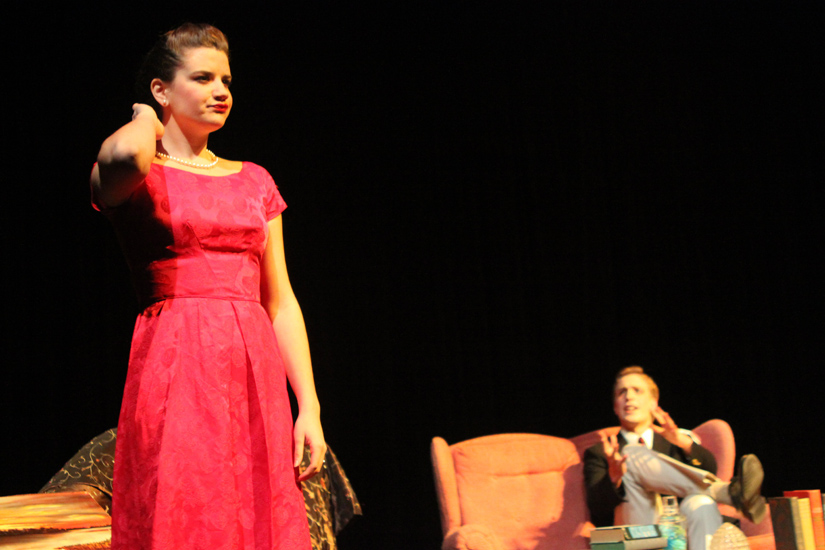See Original Article Here
The One Acts Play Festival is an annual production put on by the Ouachita Theatre Arts Department that features student-directed short plays. On December 8 and 9 at 7:30 p.m. in Verser Theatre, the six seniors who are directing the plays will see a semester’s worth of hard work come to fruition as their one act plays are performed.
“It’s in some ways our capstone course,” said Dr. Daniel Inouye, assistant professor for theatre arts and the play directing instructor. “All the other classes they’ve taken kind of lead up to what they do in this class.”
In his experience with teaching the play directing to the students, Inouye tries to impart how to approach a show as a director, how to develop a concept for the show and to take that concept and make it work within an actual production for audience members.
“It is very much a sort of hands-on class,” he said. “So a lot of it is just giving [the students] the opportunity to experience what it’s like to be a director – to take something from its inception all the way through to the actual performance. Some people don’t realize the extent of the amount of work that’s put into a production. There are usually [several months] of research and analysis before you actually start putting the show on its feet, so to speak.”
When the students do the analyses for their selected shows, they take a checklist with them as they look for certain elements in each of the units of their play.
“Play analysis takes [a long time] to get done because you literally go in line by line and analyze each individual aspect of the play,” said Jacob Watson, senior musical theatre major. “Once you’re through with that, you do tons of research on the style of the play. And then we do a style analysis and proposal where we tell the class that this is the style we’ll be performing in.”
Watson will be directing the play known as “Waiting” by Ethan Coen. He described it as a dark comedy mixture of absurdism, realism and existentialism.
After the student directors finish the analysis of their acts, they put a lot of time and effort into the casting. Since the One Acts Play Festival features six different productions, casting the roles was different than what is seen in a normal setting. During auditions, the directors had their individual rooms and the actors came into the room of the play they wanted to be a part of and conducted their audition.
“We had some 80-100 people audition for each of us,” said Moriah Patterson, senior musical theatre and theatre education major. “In my show, I only have four parts, and most of the other shows have very small casts as well. So it was a very difficult process, and seeing all these talented peers of ours made it that much more difficult as we had to narrow it down and decide on who’s perfect for each role.”
Patterson is directing is a comedic piece called “Wanda’s Visit,” written by Christopher Durang.
As the directors began to formulate who they wanted to have cast in their play, they ran into some conflict as some students auditioned for more than one performance.
“I had 82 people audition for me,” said Kathryn Kellogg, senior musical theatre and mass communications major. “And of course all the other directors have about the same number of people auditioning for them as well. So the crazy part is that you’re sitting there with the other five directors and there’s this black board and you put up your first ideal cast list. And as the others do the same, you start to see all the names that you have on your cast list appear on the others’ cast lists.”
Naturally, the directors cannot share actors for each of their plays. So what they would do in some cases was to barter and trade certain actors for the roles the directors wanted them to be cast as. In all cases, one change in their cast would mean a dynamic change for the entire scheme of their performance.
“I’ve loved working with the cast,” Watson said. “I have picked them for very specific reasons, and they have done nothing but prove over and over that they are the right cast for [the play]. But something you never want to do as a director, and especially as someone coming from the acting side of it, is you don’t want to step on what the actors are doing. It’s always tough to find the line between giving them direction and just telling them what you want them to do.”
As well as focusing on individual actors, the student directors must also be mindful of how the play performs as a whole.
“I feel like we had a really great rehearsal the other night,” Patterson said. “We had kind of gotten in a slop of how we were [performing] it – we were playing it just for jokes. Everything was funny, but not as funny as it could be. And so we had a rehearsal the other night where we played the show very seriously. And we thought it was going to be absolutely ridiculous, but it turned out to be this wonderful dramatic play, so now we have to go back and find that medium [between the two].”
Outside of guiding their actors in their performance rehearsals, the directors are also in charge of scheduling practice times, designing their sets and costumes and figuring the lighting and sound effects.
“We’re all so incredibly busy,” Kellogg said “I’ve really enjoyed directing and getting to work and making it all come together as my own vision as well as staying true to the original playwright.”
Kellogg is directing a play called “Unprogrammed,” written by Carol Mack. She is also directing the spring play “Eurydice,” written by Sarah Ruhl.
“It’s been so challenging trying to have everything come together and working around everyone’s schedule,” she said. “Opera was [two weeks ago], and I had two people involved with that. Then [we had] Thanksgiving so we couldn’t rehearse. And we’re all involved with Festival of Christmas, so it’s a lot of rushing to get things done. But then there are those moments when everyone is able to be involved and everyone’s onstage doing whatever it is that they’re doing and you’re able to guide them and create something. That’s the best part.”
Photo by Sarah Sparks.

